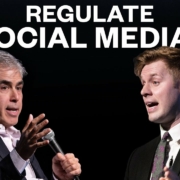What Organizations Can Do to Solve the World’s Mental Health Crisis

The world is in the midst of a mental health crisis. According to the World Health Organization, depression is a leading cause of disability globally. Among 15 to 39 year-olds in the US, suicide was the second leading cause of death in 2020.
Unfortunately, the COVID-19 pandemic left the world’s mental health status in a significantly worse state. The prevalence of depression and anxiety increased by 25 percent in the wake of the pandemic.
Stigma surrounding mental health can cause these challenges to go unreported and untreated. Severe mental illness can subsequently increase the risk for other negative outcomes, including substance use and homelessness.
According to the World Economic Forum, “The debates created by those in the public eye exemplify the complexity of an issue amplified by the “always-on” culture and pervasive technology. Employee mental health was a major issue well before the pandemic, affecting almost everyone. Research explained how 90%of workers are affected by mental health challenges, either personally or through someone they are close to.
The pandemic, however, has exacerbated the difficulties many already faced. A study by the OECD reports that anxiety has as much as doubled in some countries, with employees no doubt questioning their employers’ role in protecting their mental well-being.”
While individuals suffering from mental illness may often feel trapped and hopeless, organization leaders can have a significant impact for good. Leaders who make mental health initiatives a priority can improve their business, communities and more.
Promoting Access to Treatment
Part of the problem fueling the world’s mental health crisis (and associated problems like substance use) is how difficult it is for many people to gain access to quality care and support.
This became especially apparent during a recent conversation with Sam Arsenault Wilson, co-founder of Confidant Health. As Wilson explained, “The current system for treating substance use and mental illness is difficult to navigate and can be extremely costly. In substance use treatment, especially, there is a massive treatment gap, where only 1 in 10 people in need are accessing care.”
All too often, however, these groups remain isolated in their efforts to address mental health and other related issues. A business leader might have funding, but no clear direction on what they can do. A nonprofit may have the knowledge and skills to directly confront the issue, but they lack the money to secure the necessary resources.
When leaders come together with other likeminded organizations to address mental health issues, the pooling of knowledge and resources ultimately enables far greater results.
A great example of this comes from Gabriel Baldinucci, founder of Urban Vision Alliance, an organization dedicated to ending street homelessness (which is often closely related to mental health) through public and private coalitions.
As Baldinucci explains, “We need more stakeholders to be part of a widely shared vision and we need to accelerate work on how all the different stakeholders work together. There are well over 100 organizations working on homelessness in San Francisco and this means it takes longer to break down silos and design out inefficiencies. These natural challenges create a false narrative that the problem can’t be solved. Private sector-driven alliances have delivered results in other areas to unlock resources and can do the same for addressing homelessness. More collaboration, among a larger part of our community, is critical to solving this issue — and that’s what we aim to facilitate.”
Strong leaders drive collaborative efforts to turn their connections into something greater than the sum of their parts. Quite often, these successful mental health-focused efforts simply need a leader to provide that initial spark and connection.
Subscribe to the Ethical Systems newsletter
Make Mental Health Care Equitable and Accessible
According to Erin Walczykowski, APRN, PMHNP-BC, a psychiatric nurse practitioner working in assertive community treatment (ACT), dismantling socioeconomic barriers and bringing informed care to patients of all communities is critical. She says, “Mental illnesses can be disparaged or minimized. Ultimately, it is incorrectly identified as issues of personality or character and can result in stricter discipline or punishments. It is important to acknowledge the secrecy, shame, and denial within Black American culture that can undermine treatment. The issue of race is an integral part of mental health for Black Americans. Their connections with mental health must be addressed, an essential component of gaining trust. Develop self-efficacy and ensure they feel a sense of control of their treatment, as many times they have lived an experience culturally where their control has been taken from them, resulting in harm.”
Black, Indigenous, and people of color (BIPOC) communities in the U.S. experience a disproportionate impact of serious mental illness. For example, recent data shows that Black Americans are less likely to receive a mental health or illness diagnosis and, therefore, treatment.
For Black Americans, seeking help can be seen as a sign of weakness, resulting in exaggerated perceptions and dependence on strength, resilience, and independence. Address their perception of the negative consequences of having a mental illness and in seeking treatment. Help Black Americans to understand what emotions are, how to identify them, what they mean, and what to do with them in a way that is healthy. Provide a safe space for discussion and expression of their thoughts and emotions. Involve counseling and supportive services as needed to adjunct medical treatment.
This can be obtained by word of mouth, and organizations that connect Black Americans with clinicians (including websites and directories). It is important to increase access to and instill trust within Black Americans to utilize outpatient mental health services. This is essential to reduce the rates of emergency room care as a go-to treatment option to manage mental health crisis. Reducing stigma and increasing access to clinicians will help in providing stability of symptoms. This helps to ensure better mental health over the long-term and reduces acute presentations
How Will You Take Action?
Your organization can make a difference in addressing the world’s mental health crisis. Building mental health into the fabric of your corporate culture and building practices into your organization from the top down can destigmatize mental health issues and champion a healthier work-life balance. Even something as simple as offering training and support resources to your employees can make a difference in the lives of many individuals. Evaluate what mental health benefits you currently offer to ensure that you can truly cover the continuum of employee mental health needs, including addiction recovery. As an example, companies like Limeade offer broad and easy-to-use platforms for companies to make wellbeing a priority within their organizations.
The problem isn’t going away. Denying the challenge will only make things worse. Again, according to the World Economic Forum, “Organizations that ignore or downplay these [growing mental health challenges] do so at their peril. As many as 200 million workdays are estimated to be lost due to mental health issues each year. This is the equivalent of $16.8 billion in lost productivity. In contrast, innovation is more likely to blossom in environments where people feel valued and where they feel they can be open and honest with managers about personal challenges.”
As a leader, you have more power to make a difference for this and other causes than you might think. And your influence could be the necessary motivation to help others do the same.
Ron Carucci is an Advisory Board member of Ethical Systems as well as cofounder and managing partner at Navalent, working with CEOs and executives pursuing transformational change for their organizations, leaders, and industries. He is the bestselling author of eight books, and his work has been featured in Fortune, CEO Magazine, Harvard Business Review, BusinessInsider, MSNBC, BusinessWeek, and Smart Business.
Reprinted with permission from Forbes









